The world is undoubtedly emancipating itself from the traditional economy, forging its way into the digital economy. Nigeria as a developing country is also striving to establish itself along these lines and perhaps be at par with other advanced countries of the world.
Even though the phrase ‘Digital Economy’ is seemingly ambiguous to certain individuals, thus not helping them have the actual knowledge of its meaning; the next time you log on your mobile banking app, shop online from Jumia or Konga, advertise your products and services on social media or watch a movie with Netflix, you are participating or engaging in a digital economic activity.
Sufficiently, Digital Economy is simply the use of electronic and telecommunication technology for economic activities. A digital economy is an economy which functions primarily by means of digital technology, especially electronic transactions made using the internet.
Having known what a digital economy is and the transformation abound therein, there is no proof about the necessity of such innovation especially in a developing country like Nigeria.
However, some feats have been recorded in the quest for a Digital Nigeria by the current Federal Ministry of Communications and Digital Economy under the leadership of Dr. Isa Ali Ibrahim Pantami, who emerged Muslim News Nigeria best performing Minister in the cabinet of President Muhammadu Buhari.
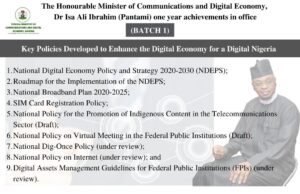
The good work of the Ministry commenced when His Excellency, President Muhammadu Buhari approved the submission of the Honourable Minister of Communications to expand the Ministry’s mandate to cover Digital Economy to capture the goals of digitization of the Nigerian economy in line with the Economic Growth and Recovery Plan (EGRP).
In order to achieve this, the Honourable Minister proceeded to set performance targets and an appraisal mechanism for Chief Executive Officers of Parastatals under the supervision of the ministry to improve on the quality of services and enhance revenue generation from the ICT sector of the economy.
On the 19th of March, 2020, the Ministry of Communication and Digital Economy under the leadership of the Honourable Minister launched and unveiled the new National Broadband Plan 2020-2025 as the previous Broadband Plan expired 2018. The Ministry simultaneously commissioned the Communications and Digital Economy Complex and commissioned the National Emergency Toll-free number – 112.
On the 13th of May 2020, the Honourable Minister organized and coordinated the first ever virtual Federal Executive Council meeting. Ten (ten) FEC meetings have since then been held virtually which has helped immensely to ensure compliance with the NCDC’s protocol of social distancing and yet not paralyzing governmental activities during the COVID-19 pandemic .
On the 2nd of June 2020, His Excellency, President Muhammadu Buhari approved the Honourable Minister’s request to declare Telecommunication Infrastructure as critical National Infrastructure. This was to encourage Investment and improvement of quality of service across the country.
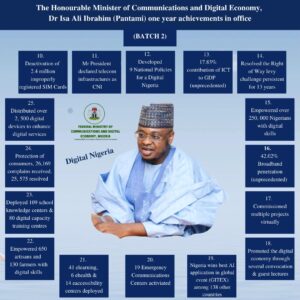
Another tremendous achievement of the Honourable Minister was recorded when he met with stakeholders (Nigeria Governors’ Forum) to resolve the issues of ROW (Right of Way) Levy which has been lingering for over 13 years in the country.
This engagement by the Honourable Minister resulted in many states either waiving their ROW levy or implementing a downward review to the agreed ~N~ 145/per linear meter. This improved the economy of the States that have implemented and ensured quality and reduced cost of services.
In order to improve on the quest for a Digital Nigeria and involve a larger population of the citizenry, the Ministry embarked on a project termed Digital Economy Projects for a Digital Nigeria. The projects have so far covered four (4) phases since its inception.
The First Phase of the Projects included the commissioning of six (6) projects by the Honorable Minister:
The First Phase of the Projects includes the commissioning of six (6) projects by the Honorable Minister:
I. Tertiary Institution Knowledge Center, Enugu.
II. Information Technology Hub Development, Lagos.
III. NIGCOMSAT Northwest Regional Office, Kaduna.
IV. Emergency Communications Center, Kaduna.
V. I.T Community Center, Katsina and
VI. I.T Hub, ABU, Zaria.
The Second Phase of the Digital Projects are:
I. Tertiary Institution Knowledge Center (TIKC), DELSU, Abraka, Delta State.
II. School Knowledge Center (SKC), Government Day Secondary School, Hassan Central, Gombe State.
III. E-Health/Data sharing Center College of Medical Sciences, Abubakar Tafawa Balewa University, Bauchi State.
IV. Virtual Examination Center, UNIMAID, Borno State.
V. Emergency Communications Center (ECC), Ilorin, Kwara State.
VI. Emergency Communications Center, Calabar, Cross-Rivers State.
VII. Information Technology Innovation & Incubation Park, Kogi State University, Ayingba, Kogi State.
VIII. Information Technology Capacity Building Center, Federal University of Technology, Owerri, Imo State.
IX. Information Technology Capacity Building Center, College of Education, Gimel, Jigawa State.
X. New Neighborhood Post Office/Nirsal Microfinance Bank Branch, Delta State.
XI. Remodeled National Mail Exchange Center, Mbiama, Ahoada West L.G.A, Rivers State.
The Third Phase of the Digital Projects:
The Honorable Minister commissioned the newly completed Digital Center which accommodates
integrated computer emergency response and readiness center; Digital Media Studio for virtual learning; and Digital Conference Center for remote collaboration.
The Fourth Phase of the Digital Projects:
I. E-accessibility at Government School for the Deaf, Malumfashi, Katsina State.
II. E-library, Federal College of Education (Technical), Bichi, Kano State.
III. School Knowledge Center (SKC), AUD High School, Ikole-Ekiti, Ekiti State.
IV. Virtual Examination Center, Enugu State College of Education (Technical), Enugu State.
V. Digital Capacity Training Center, El-Kanemi College of Islamic Theology, Yola, Adamawa State.
VI. ICT Innovation Hub, Oyo State Trade Fair Complex, Samonda, Ibadan, Oyo State.
VII. Flag-off of NITDA Capacity Development Programme in support of Artisans in Niger State, Oyo State, Kogi State, Delta State and Imo State.
Apart from the vigorous pursuit of a Digital Nigeria, Honourable Minister, Dr. Pantami used his Ministry to contribute to the country’s macro challenges like insecurity and corruption.
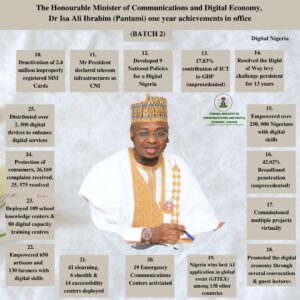
In order to tackle the lingering issue of insecurity ravaging the country, the Honorable Minister on the 13th of September 2019, through his Ministry sent a message across to Nine million, four hundred thousand (9.4 million) sim card users through their respective telecom operators to ensure the users comply with proper procedures of SIM registration.
In order to enforce the aforesaid guideline, the Ministry on the 25th of September 2019 ordered the deactivation of the defaulting 2.2 million sim cards in Nigeria on the directive of the Honorable Minister.
This is to prevent the use of such SIM cards for criminal activities and support our security agencies.
On the 21st of October 2019, the Honourable Minister gave expert opinion and submitted a policy on the best ways to deploy ICT in enhancing the security of Nigeria to the National Assembly’s ad-hoc committee on Nigeria’s security challenges.
On the 6th of February 2020, the respected Islamic scholar who goes to work with his faith directed a review of the policy on SIM card registration and usage. This is aimed at improving the security of citizens and ensure SIM cards are not used for criminal activities. This has also invariably supported our security agencies in their investigation processes.
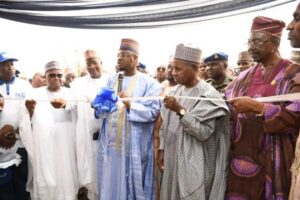
Dr. Pantami’s keenness on a safer Nigeria birthed the ECC project (Emergency Communication Centres). The project is intended to bridge the communication gap between the distressed and emergency response agencies in the country. The project cuts across the 36 States of the federation and the Federal Capital Territory, Abuja. All telecom operators are mandated to route emergency calls through the dedicated toll-free number, 112, from each State to the emergency centre within that State, thereby allowing the operators, who are resident in the ECC to process the distress call and contact the relevant emergency response agency.
Numerous centers have so far been built and provided with equipment across the nation in all six geopolitical zones.
The Honorable Minister’s zeal to tackle corruption and uphold the sanctity of consumer rights protection saw him order the suspension forthwith of illegal USSD charges by telecom operators on the 20th of October 2019. The directive is targeted at protecting the citizens’ interest from direct billing charges by telecom operators which is not favour to the citizens.
On the 7th of November 2019, the Honorable Minister gave the directive for the termination of all cash payments in the Nigerian Postal Service (NIPOST) offices nationwide. This is to promote Digital Economy and fight corruption.
Relentlessly on the 14th of November 2019, the Honorable Minister directed the deactivation of automatic voicemails which has stopped suspicious charges and protected consumers of telecommunication services.
As though these achievements weren’t enough, the Economy’s GDP metamorphosis leapfrogged under the administration of Dr. Pantami. Sometime around September 2019, the ICT sector overtook the Oil and Gas sector in contribution to Nigeria’s GDP. The ICT sector currently contributes about 14.07% of Nigeria’s GDP.
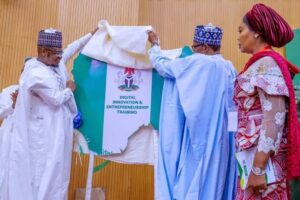
On the 6th of October 2019, the Honorable Minister led and coordinated Nigeria’s successful participation at the 39th Gulf Information Technology Exhibition (GITEX) in Dubai, the United Arab Emirates, where Nigerian startup, Chiniki Guard won the Best Artificial Intelligence Application in the GITEX UAE Supernova Challenge, out of 130 countries that participated; which thereby attracted investors into Nigeria’s ICT sector.
Under the leadership of the Honourable Minister, the Broadband Penetration of the country was recently reported to have hit 40.18%. The Broadband Penetration was just over 30% hitherto. Almost 10% achieved in less than a year. This translates to around 1.38% increase in GDP.
These enormous achievements are things to talk about. It is yet another thing to understand that these achievements were acquired within the space of a year. The only signal sent through this long list of achievements within a year is that Dr. Ibrahim Isa Ali (Pantami) is a man to reckon with.
In case you missed the first part, entitled; Uncommon feats of Dr. Pantami, Muslim News Nigeria Minister of the Year (1), Read it below
Uncommon feats of Dr. Pantami, Muslim News Nigeria Minister of the Year (1)
By Rasheed Abubakar and Babatunde Kazeem



